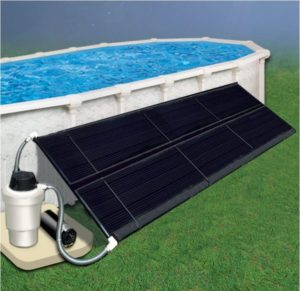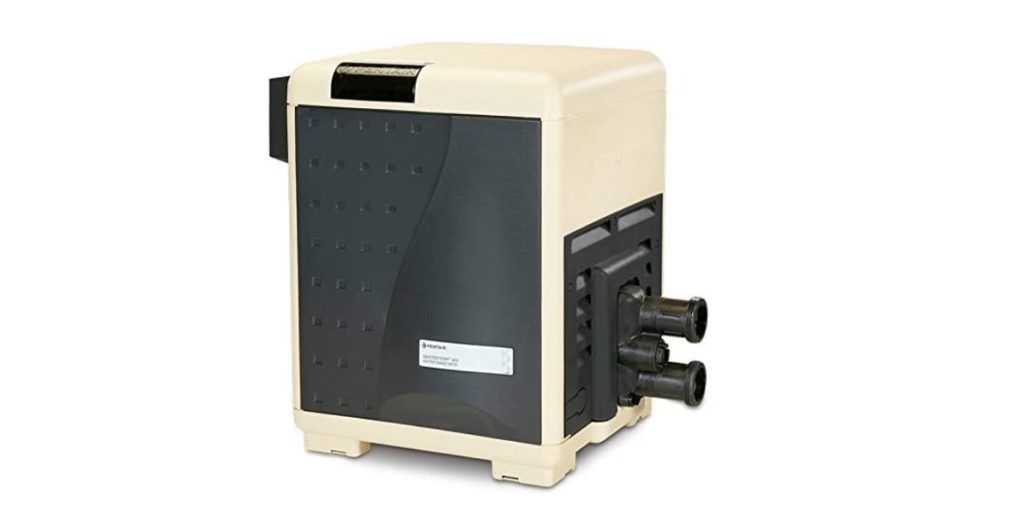EVERYTHING YOU NEED TO KNOW ABOUT POOL HEATERS 2025
Swimming is one of the most stimulating activities. It keeps you fit, and you can enjoy it with anyone. For any party, hang out with friends, and other reasons, a pool would be a great addition to your house. Whether you have an ‘above-ground’ pool or standard pool, pool heaters can prove to be a viable investment.
There are misconceptions and a lack of information regarding inground pool heaters and pool heaters above ground. Today, we are going to clarify some of the common questions. We aim to cover a broad spectrum of topics and questions regarding the pool heaters. It will help you decide whether you should invest in one of these or not.

What Is A Pool Heater?
Table of Contents
A pool heater is one of the most prevalent methods to heat your pool. It allows you to extend the season of swimming. Most of the pool heaters utilize natural gas, electricity, or propane to function. They regulate the water by heating the water and releasing it in the pool to maintain the temperature.
It is feasible to invest in them. However, if you have a propane or natural gas pool heaters, you might have to continually invest in the refuelling. Electric pool heaters or solar pool heaters are more cost-efficient. Propane or gas pool heaters tend to be more powerful and better for bigger pools. If you have a residential scale pool for the family, an electric pool heater is a better option. They are easy to use, easy to install, and heat the pool fast.
Correlatively, if you go for a natural gas or swimming pool heaters gas, the cost can vary between $3 (natural gas) to $9 (propane) per hour. In the long run, these types tend to be more costly than other available options.
Different Types Of Pool Heater
Pool heaters have a singular purpose of regulating a pool’s temperature. However, there are three different power options available for pool heaters. These power sources affect performance and have specific differences. If you want to invest in a pool heater, you need to determine how often you will use it. Then contemplate the standard temperature and climate of your region before choosing a pool heater. Regardless of those factors to consider, here are the three primary types of pool heaters available in the market:
- Electric Pool Heaters: These tend to have a fast heating capacity and prove to be highly efficient. An electric pool heater draws ambient air and circulates it through itself and heats it to transfer it inside the pool. It goes through a different process where the air is first neutralized in temperature, then warms up before passing through a compressor for extra heat. Then this hot air is released in the pool to maintain the temperature.
- Solar Pool Heaters: Sonar panel pool heaters are the most notable addition to these heaters. These heaters utilize the heat from the sun and use it to heat the water. There are different types of pool heaters available in this spectrum. You will find the ones you cover the pool with or others that utilize diameter tubes to process the water. However, a significant drawback is that if you use a cover-type heater, it will not regulate or maintain the temperature. The water will eventually cool down. Secondly, it is not useful in a season when there’s no sunlight.
- Gas Pool Heaters: Anything that utilizes gas happens to be the most potent selection in the group. The same applies to natural gas heaters. These can quickly heat your pool and utilize gas to combust and regulate temperature. You can set the temperature higher than electric or solar can reach. Effectively, if you have a robust enough heater, you can turn it into a spring or Jacuzzi type pool.
Pool Heater Gas Vs Heat Pump – Are They Different?
Heat pumps utilize ambient heat from the atmosphere. These tend to be highly efficient and save a lot of energy. A heat pump collects heat from the atmosphere and transfers it to the pool. Most of the time, these are good for areas with warm or hot climates. However, in a cold environment or season, in the absence of heat, a heat pump is virtually useless. Therefore, while a heat pump may be an efficient addition, you need to consider where you live. Anywhere with temperature below 55 degrees Fahrenheit is not the right place to get a heat pump for.
Reasons To Get A Pool Heater For Above Ground Pools
There are many questions a person has regarding pool heaters. Some wonder if they are worth the investment. Others believe that pools should be used in summer. Despite all of these debates, we are bringing you a list of compelling reasons to decide to buy a collection:
- Year-Round Swimming: The primary benefit of getting a pool heater is that you can enjoy swimming year-round. For pool parties or to hang out with friends, you can use the pool heaters. The season won’t stop you, nor will the cold climate.
- Excellent For Health: Bathing in warm water is healthy, taking a relaxing dip in the spring. You can get benefits by integrating a pool heater. Imagine a relaxing dip in the pool after a tiresome day at work. It helps you excrete toxins and keep you in shape too. If you are a pool lover, then a pool heater becomes pivotal.
- Train Yourself: You can enhance your swimming performance, endurance, and other physical capabilities by swimming in warm or hot water. Imagine the stress it could build on you. Correlatively, you will learn to withstand it for better performance.
- Easy Maintenance: Let’s not forget about cleaning the pools and maintaining them. Whether you use in ground pool heaters or above-ground ones, they can help you maintain your pool. In cold winters, you can warm up the water and clean it to regulate the upkeep, among other things.
All of these are great reasons. However, the most prominent reason will remain the requirement of all-season. If you live in a region with a cooler climate, then a heater is a must-have. You can use a pool heater for swimming at any time of the day or night, without any health concern. That’s what makes pool heaters a worthwhile investment.
Are There Benefits To Having Pool Heaters?
There are many comparison you can get such as electric pool heaters vs gas or propane pool heaters vs electric. We are bringing you the benefit for each with clear distinction of use. Any extra benefit depends on the type of pool heater you are using:
- If you’re using a pool heater solar panels, then the energy is free. You extend your swimming seasons by almost double. It allows you to heat your pool and have extended fun without any expense on fuel and other utilities because solar heaters utilize solar panels.
- If you plan on using the heater year-round and want to make it cost-effective, a pool heater electric module would be better. While it requires maintenance and upkeep, it can be a cheaper alternative without relying upon solar power. These offer balanced performance and heating to help you get by.
- For bigger pools and quick heating, natural gas pool heaters are the best options. These have superior performance and help in providing swift warm water. If you are an occasional swimmer and have unpredictable swimming urges, then this is a good option. You can work it year-round for occasional application.
Important Tips To Consider
A pool heater will last at least three years in any given condition. Most of the swimming pool heaters have a life expectancy of around seven to ten years. However, chemical imbalances such as chlorine, salt, and ph. may obstruct efficient performance. You have to consider the type of water and its content because that can impact how much does pool heaters cost.
A heater may malfunction within six months of installation. Calcium balance is pivotal to consider. Galvanic corrosion and other agents tend to damage the heaters the most. You have to take these measures to ensure that your pool heater lasts longer:
- Ensure proper bonding and grounding of the wire to prevent any malfunction caused by a voltage or electrical build-up.
- Invest in other pool equipment such as pump, filter, heater, and saltwater chlorinator. These should be installed in the stated specific order for optimum performance. You can add a corrosion resistant check valve to further enhance the maintenance and upkeep.
- The idea water index is ph. balance between 7.2 to 7.8. Chlorine should not surpass ten ppm in any manner. 1-3 ppm is ideal for safe skin health and swimming purposes. It is suitable for components of other equipment. Calcium should be below 400ppm as scale-building is a primary cause of damaging the pool heaters and other equipment. A perfect condition would be to have ppm below 200.
Final Thoughts
Pool heaters cost marginally greater than other pool equipment. Thus, it is vital to take proper consideration. There are many factors for you to consider, such as the size of the pool, season, and the power you’re looking for. However, if you doubted purchasing a electric pool heater or others, you finally have all the answers. We hope that these questions and information helps you make a better decision regarding pool heaters.
- How to Clean a Toaster Oven Tray Easily? (Inside & Outside) - December 12, 2025
- Best Electric Scooter for Heavy Adults up to 330 LBS In USA - December 12, 2025
- Best Smart Thermostat for Electric Baseboard Heaters - December 12, 2025


